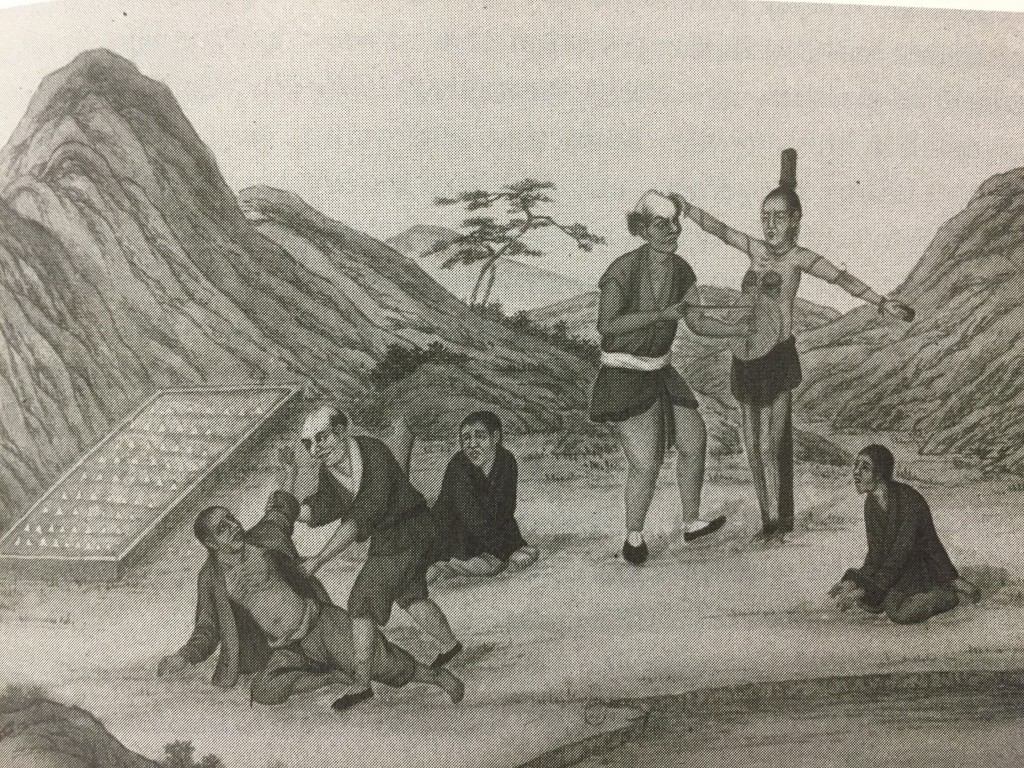The Forgotten Sense (fragment)
Pablo Maurette
translated by Andrea Rosenberg
In the winter of 1904–1905, in Beijing, a bodyguard named Fuzhuli was accused of killing his master, a Mongol prince, with a butcher knife. The punishment set forth by the Qing code[1] for crimes of such a serious nature (regicide, patricide, matricide, and other “enormicides”) was the infamous execution by lingchi, which had been practiced in China since the time of the Liao dynasty (tenth century). Lingchi, commonly translated as “death by a thousand cuts,” consisted of tying the condemned man to a post and cutting him into pieces. On that winter morning in the Beijing vegetable market, before a silent crowd, the executioner began carving large slices of flesh off Fuzhuli’s chest, biceps, and thighs; then cut off his limbs; and finally decapitated him. Once the process was over, the executioner uttered the standard declaration: “Sha ren le” (“This person has been executed”). Lingchi did not involve an interminable torture session; it generally lasted only a few minutes, and usually the executioner, after making a couple of cuts, stabbed the condemned man in the heart to put an end to the nightmare. Contrary to what a scandalized Europe chose to believe, the cuts numbered not a thousand but only a few dozen. It was also customary to offer the prisoner large quantities of opium so he would not suffer. Soon after Fuzhuli’s execution, which was photographed and circulated in Europe thanks to a book by Louis Carpeaux (and later thanks to the morbid aestheticism of Georges Bataille in The Tears of Eros), China abolished lingchi.
Despite the misapprehensions of the Norwegian, English, French, and Spanish chroniclers who attended these executions and were fascinated by the idea of “Chinese torture,” the purpose of lingchi was not the infliction of inhuman suffering but instead dismemberment. Lingchi was the form of execution reserved for the most aberrant crimes in the Chinese penal code because its objective was to dismantle what one Sinologist and legal historian called “somatic integrity.”[2] The human body is a collection of parts—limbs, organs, muscles, tendons, and so on—that make up an organic whole. The perception of that wholeness is owed in large part to propioception, a type of haptic perception. Humans perceive themselves as being a sum of parts, but that perception is enforced by a fundamental undergirding experience: that of being an indivisible and inalienable unit. Lingchi is an assault on that fundamental experience, revealing it to be only a belief, an act of faith. The process of dismantling the body exposes its true nature—divisible, fragile, and contingent—by transforming the person, the “human being,” into a pile of pieces of flesh. The fact that the condemned man was given opium to anesthetize him is all the more revealing. Protected by the poppy’s magical narcotic and analgesic powers, Fuzhuli becomes numb to the agony: it is intangible. Before the executioner makes the first cut, Fuzhuli has already ceased to be a sentient body and has become a heap of flesh to be cut into pieces. Touch is the only sense we cannot lose, because losing it means ceasing to be a person and becoming mere flesh. Fuzhuli, drugged and tied to a pole, is like a cadaver on the table in an anatomical theater: a didactic spectacle. Anyone who observes the execution, who observes the ease and speed with which a person is reduced to a pile of lumps of flesh, returns home not just with a brutal memento mori but having learned a valuable lesson about the true laws that govern human life: the laws of physics. If everything is the body and the body is, fundamentally, divisible, pieces and textures are all that remain.
I read about Fuzhuli’s execution for the first time during a break at the National Library in Paris. I had been awarded a scholarship to spend a month comparing Renaissance editions of Lucretius’s On the Nature of Things, which I would use in the first chapter of my thesis. On occasion, while waiting for the librarians to retrieve the books I’d requested, I would browse the stacks in the basement. It was thus that I came across Louis Carpeaux’s book and the chilling photo of Fuzhuli. The subject of my research was the discovery of Lucretius’s work in Renaissance Italy, and especially its influence on the writings of a pioneer of epidemiology named Girolamo Fracastoro, who lived during the first half of the sixteenth century. As tends to happen when one is totally immersed in a topic, a powerful monothematic (if not monomaniacal) tendency led me to associate the history of capital punishment in China with that of the rediscovery of the Roman poet and philosopher in Italy. The more I thought about Fuzhuli’s execution, the better I understood the forbidden fascination that Lucretius aroused among Renaissance intellectuals. To prevent this unusual association from running aground on the shoals of absurdity, we must begin our discussion at the relevant moment.
In the summer of 1549, Giambattista Bussini, one of the innumerable humanist clerics who abounded in Rome under Pope Paul III, was present at a curious event. It might be going too far to declare it emblematic of the secularism that was to characterize modernity, but what happened in the meeting that Bussini described to his friend, the art historian Benedetto Varchi, is manifestly a postcard from the future of science and Western culture; a future that the church itself, which had organized the meeting, did not even suspect and about which it doubtless would have been scandalized. During that 1549 meeting, attendees discussed which new works to include in the infamous list of banned books that would be formalized a decade later under the title Index librorum prohibitorum. Faced with the growing Protestant threat, and only four years before the Council of Trent began, the intransigence of the Catholic church had reached its apex. The list of forbidden books written by atheists, heretics, Lutherans, antipapists, and pagan sympathizers grew ever longer, and someone at the meeting suggested including De rerum natura (On the Nature of Things), the philosophical poem in dactylic hexameter by the ancient Roman poet Titus Lucretius Carus. The nomination was hardly unjustified. Lucretius was an Epicurean who believed the universe was eternal and infinite and that the human soul was material, divisible, and therefore perishable. As for the divine, he was little interested in its existence and claimed that, if the gods did exist, they too were material beings, but composed of such delicate atoms that it was impossible for their actions to affect us. For Lucretius, concepts such as providence, rewards and punishments from beyond the grave, and divine intervention were lies cooked up by priests and theologians to keep the masses fearful and subdued. Lucretius’s verses are dazzling; his arguments, solid: Lucretius is convincing. De rerum natura may be the most virulent and beautiful anticlerical manifesto in the history of the world. The work had already been banned in the schools of Florence by 1517, and the term “Epicurean” was synonymous with “atheist” in the sixteenth century. And yet, when someone suggested including Lucretius among the forbidden authors at that meeting in 1549, incredibly, miraculously, absurdly, the suggestion was not well received. Cardinal Marcello Cervini argued that banning the book was unnecessary, as the pagan myths it contained were utterly harmless.[3] In the decades and centuries that followed, Lucretius’s work in particular and atomist materialism in general would profoundly influence and shape the thinking of figures such as Giordano Bruno, Francis Bacon, Galileo Galilei, Pierre Gassendi, Thomas Hobbes, Isaac Newton, Denis Diderot, Charles Darwin, Thomas Jefferson, Karl Marx, Albert Einstein, and Erwin Schrödinger, among others. Antiprovidentialist materialism and the conviction that nature conceals within it the keys that can unlock its secrets are pillars of atomist thinking and helped lay the foundations of modern science. Though Cardinal Cervini’s pragmatic attitude did not increase the importance or influence of the work—Lucretius had already been an influential author among the Italian pioneers of the new science for more than a century—it is a clear demonstration of the inevitability of the secular path that modern thought would take. And this secular turn was in great measure inspired by ideas disseminated by Lucretius, a poet and philosopher for whom the cornerstone of existence and perception was the sense of touch.
The second book of On the Nature of Things begins with the image of a man on a cliff watching a storm rage over the sea. The poet reflects on the strange sensation of satisfaction and fear experienced by someone witnessing a catastrophe from the safety of shelter. Lucretius explains that the pleasure that person feels is not the product of someone else’s suffering (Schadenfreude) but simply the consequence of knowing himself to be momentarily safe from harm. Similarly, reflects the poet, drawing an analogy, a person who is able, through philosophy, to elevate his knowledge beyond that of all other men will understand the nature of things and loses irrational fears that govern his life—in particular, two of them: fear of death and fear of the gods. Observation from a distance produces pleasure. The adjective that Lucretius uses, and that guides this, the fundamental book of On the Nature of Things, is tactile: suavis—that is, “smooth” or “pleasurable.”[4] Here we have the famous pleasure exalted by the Epicureans, the pleasure of avoiding suffering through knowledge, the pleasure of distance and detachment, a smoothness that caresses every atom of the body and spirit. So that young Memnius, to whom Lucretius dedicated the poem, will learn to enjoy this Epicurean smoothness, the poet devotes the second book to untangling the complex ontology and epistemology of atomism. Both center on an idiosyncratic notion of haptic perception.
Lucretius composed his poem sometime in the mid-first century BC. We know that the work enjoyed fame among his contemporaries. Cicero and Virgil read and admired it. In the first centuries of the Christian era and for the whole of the Middle Ages, however, the poem was almost entirely forgotten. In 1417 a humanist adventurer, rare book hunter, and explorer of forgotten libraries, Poggio Bracciolini, happened across a manuscript of Lucretius’s work in a German monastery. He knew at once that his find would capture the interest of his friends in Italy. He was not wrong. Not only did Lucretius become part of the classical canon, but also, surreptitiously, his ideas ended up shaping the discourse of secular science. This is the Lucretian miracle: despite its staunch anticlericalism, its dogmatic sensualism, its denial of the afterlife, its ideas on the eternity of the universe and the infinity of worlds, On the Nature of Things is rescued from censorship. Two of the greatest poets of the late fifteenth century, Angelo Poliziano and Giovanni Pontano, revere it. Pontano says, “Lucretius takes his readers where he wants to go”[5]; Ficino, Machiavelli, and the editor Aldo Manuzio, among others, succumb to the contagion of Lucretianism as well. They are not only captivated by the poetry but also galvanized by the ideas. Pious Ficino, fascinated by the text, writes a commentary that he later burns in a fit of guilt. “I offered it to Vulcan,” he tells a friend, with combined embarrassment and relief.[6] Sometimes, Lucretius explains, the doctor must sweeten the cup that contains the bitter medicine so that the child will drink it and be cured.[7] Poetry is the honey that sweetens the cup of knowledge. Human beings are like children who are afraid of the dark: to help them lose their fear and become free, one must explain how nature works, convince them that the supernatural does not exist, that everything is material, atoms falling for ever and ever through the void. Lucretius uses an unusual verb to confess that he has infused his cup of knowledge with the honeys of epic poetry: the verb is contingo, a compound of tangere, “to touch,” and the preposition cum, from which the word “contagion” is derived. Contagion is a touch that brings something with it, that leaves something behind, that transforms and influences. Equating the emergence of Lucretius with the spread of a contagion is fitting because his poetry and his thinking—which are inseparable, almost indistinguishable from each other—entered the bloodstream of European humanism like a disease that upheaves and transforms. Europe was infected by Lucretius, by his haptic poetry and his philosophy of the tangible, the way one is always infected: without realizing it.
* *
El sentido olvidado (The Forgotten Sense) was published by Mardulce Editoras in July 2015.
Image via the Charmet Archives of the National Library of France.
[1] The Qing legal code, which comprised around two thousand statutes, was in force between 1644 and 1912 (the years of the Qing dynasty).
[2] Cf. Melissa Macauley, Social Power and Legal Culture: Litigation Masters in Late Imperial China (Stanford: Stanford University Press, 1998). For more on the history of lingchi, see Death by a Thousand Cuts, by Timothy Brook, Jérôme Bourgon, and Gregory Blue (Cambridge: Harvard University Press, 2008).
[3] Giambattista Bussini, Lettere a Benedetto Varchi sopra l’assedio di Firenze (Florence, 1860), p. 241.
[4] Lucretius, II, 1–19, p. 36.
[5] Giovanni Pontano, I dialoghi (Florence: Sansoni, 1943), pp. 238–239.
[6] Marsilio Ficino, Theologia Platonica 14.10 and Epistles 11.25.
[7] Cf. Lucretius, IV, 22, p. 109.
[ + bar ]
Junot Díaz: “We exist in a constant state of translation. We just don’t like it.”
Interview by Karen Cresci
Read More »Evita Fashionista
Mariano López Seoane translated by Heather Cleary
A decade ago, the New York philosopher Jennifer Lopez gave us “Jenny from the Block,” an ode to upward mobility... Read More »
Hoag Holmgren
reniform
free-arm comfort of raptor shadows splashing skin with dusk among the dwarf pines shaped by wind eyes carved on the antlertipped spear haft remember the damselfly sifting through mulberry fumes the... Read More »
on Edwidge Danticat’s Create Dangerously
Corine Tachtiris
Men anpil, chay pa lou, says a Haitian Creole proverb, many hands make for a light load. As the only Haitian writer widely known to English-language... Read More »








 sending...
sending...